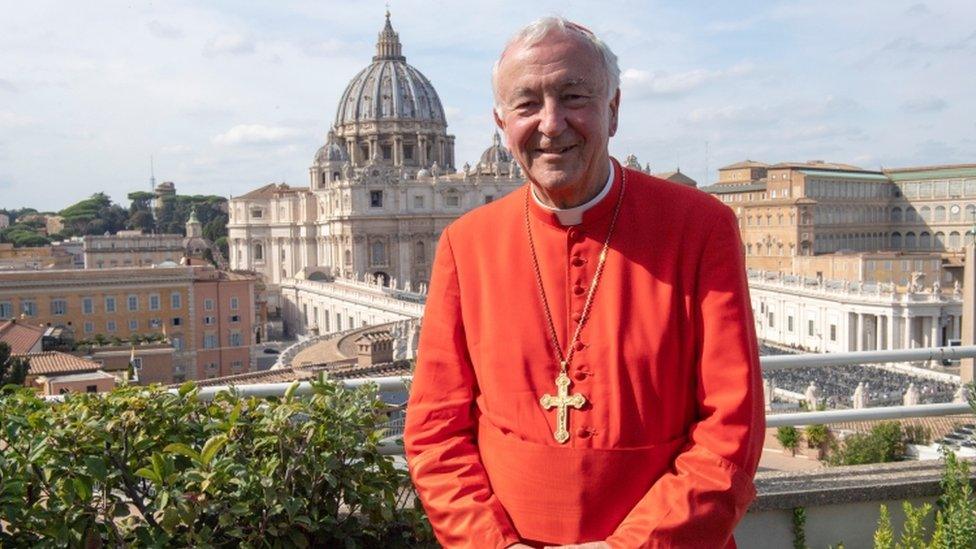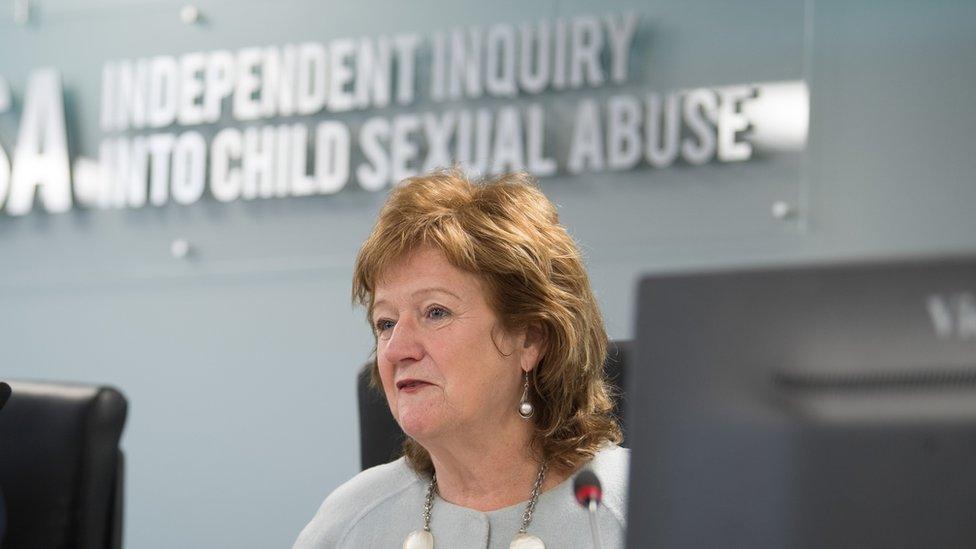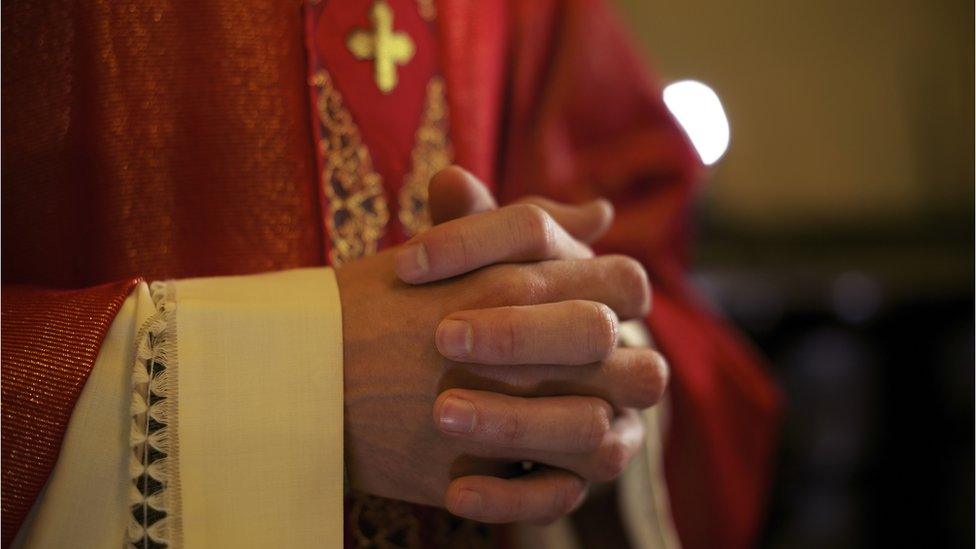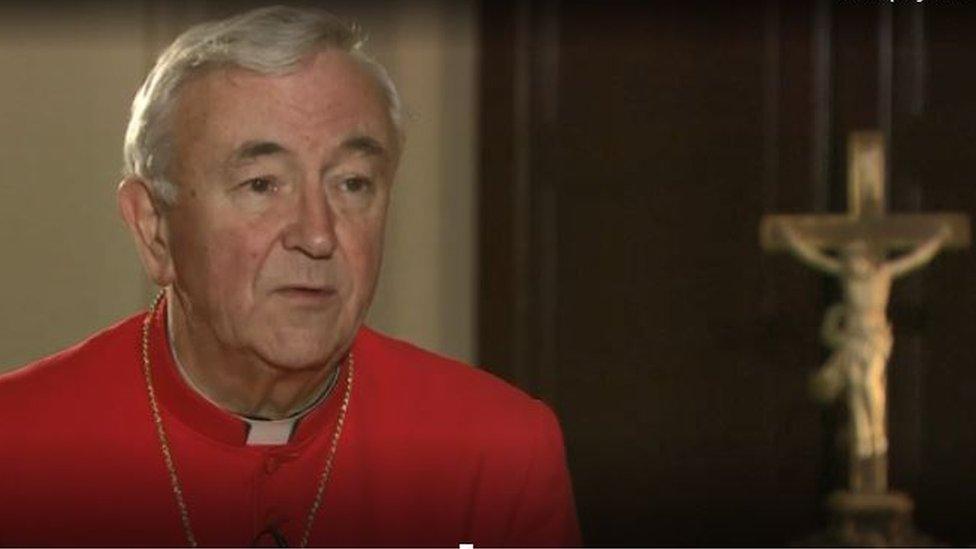Catholic Church abuse: Cardinal Vincent Nichols criticised over leadership
- Published

The report said the Archbishop of Westminster, Cardinal Vincent Nichols had sometimes failed to demonstrate compassion
The head of the Roman Catholic Church in England and Wales has, at times, shown he cares more about the impact of abuse on the Church's reputation than on the victims, a report says.
The Independent Inquiry into Child Sexual Abuse criticised, external the leadership of Archbishop of Westminster, Cardinal Vincent Nichols, and the Vatican.
The cardinal said the church was "deeply sorry this happened".
A lawyer representing survivors said the cardinal "must go right away".
Cardinal Nichols told the BBC he had offered to resign on Sunday upon turning 75, as is church law when bishops reach this age, but this was rejected by the Vatican.
He said: "I offered my resignation to Pope Francis. His answer has come back very clear, very unambiguous. He wants me to stay in post, so I will stay because that's where my orders come from, that's where my mandate comes from.
"He wants me to stay - I'm going to stay and continue to work wholeheartedly at these matters."
The inquiry found that between 1970 and 2015 the Church received more than 3,000 complaints of child sexual abuse against more than 900 individuals connected to the Church.
Those complaints involved more than 1,750 victims and complainants, though the report said the true scale of abuse was much higher and would likely never be known.
It was "far from a solely historical issue", the inquiry found, adding that more than 100 allegations of abuse had been reported each year since 2016.
The Catholic Church's "explicit moral purpose has been betrayed by those who sexually abused children, and by those who turned a blind eye and failed to take action against perpetrators".
It said the cardinal, who apologised for the Church's actions when he gave evidence, "did not always exercise the leadership expected of a senior member of the Church, at times preferring to protect the reputation of the Roman Catholic Church in England and Wales and in Rome".
It added that Cardinal Nichols had shown "no acknowledgement of any personal responsibility to lead or influence change".
"Nor did he demonstrate compassion towards victims in the recent cases which we examined."
Victim described as 'needy'
The report said that two previous inquiries into abuse in the Church, by Lord Nolan in 2001 and Lady Cumberlege in 2007, had brought change and improvements, but their recommendations had been implemented too slowly and not in full.
It highlighted that in 2016, internal correspondence between members of the Diocese of Westminster's safeguarding commission described a victim of sexual abuse as "manipulative" and "needy".
The report states: "Real and lasting changes to attitudes have some way to go if the Roman Catholic Church is to shake off the failures of the past."
One of the "repeated failures" highlighted in the IICSA report was the case of Father James Robinson, a serial paedophile, who was moved to another parish within the Archdiocese of Birmingham after complaints were first made in the 1980s.
He later fled to the US but was extradited back to the UK where he was convicted in 2010 of 21 sexual offences against four boys and jailed for 21 years.
The report said "appalling sexual abuse" was inflicted on pupils at Ampleforth College in North Yorkshire and its adjoining junior school.
Five people connected to the school have been convicted or cautioned in relation to "offences involving sexual activity with a large number of children, or offences concerning pornography", the report said.
One of them was Father Piers Grant-Ferris who was moved to at least six other parishes after allegations of abuse came to light 1975.
He was convicted of indecent assault against 15 boys in 2006.
'Shocking scale of abuse'
The inquiry also criticised the Vatican, describing its actions as in "direct contrast with Pope Francis's public statement on child sexual abuse".
In 2019, the Pope called for "concrete and effective actions that involve everyone in the Church".
The Holy See did not provide a statement to the inquiry and the ambassador at the time refused to give evidence.
The report said: "In responding in this way, the Holy See's stance was contrary to the spirit of its public statements and it missed the opportunity to demonstrate its engagement and leadership on the issue of child sexual abuse."
It added its response "manifestly did not demonstrate a commitment to taking action".
One abuse survivor said it was bad enough to have been abused but "to have it dismissed and covered up just takes even more of a toll on you".
Another survivor, who gave evidence to the inquiry, said "thousands of pounds have been spent by the Diocese of Westminster in employing lawyers to keep me at arm's length" as they continued to make their case.
They added: "The church needs a seismic shift in culture, especially at the top. If there is any hope at all of real change it will require a relinquishing of power, and a will to treat survivors as human beings."
Richard Scorer, specialist abuse lawyer at Slater & Gordon who represents 32 survivors in IICSA, said: "This is an absolutely damning report.
"It highlights the shocking scale of abuse, the disgraceful slowness of the church's response, the abject failures of leadership by Cardinal Nichols, and the Vatican's appalling refusal to cooperate properly with the inquiry.
"Cardinal Nichols needs to go right away - in any other walk of life he would be gone immediately."
Responding to the report, Cardinal Nichols told the BBC: "The things in this report are in the public sphere, and I'm sure they've been taken into account, but the response I've got is very unambiguous. It is to stay, and stay I will."
He continued: "I'm not here to defend myself... I am here to say we accept this report, we are grateful to IICSA for bringing the light and giving public space to those who have been abused, we are deeply sorry this happened...
"Today is more about me saying again, on behalf of everybody in the Catholic Church, how deeply, deeply regretful and sorry I am that anybody suffered, and that so many suffered is a terrible shame with which I must live and from which I must learn."
The report follows the publication of a similar inquiry into abuse in the Church of England, which concluded the church had created a culture where abusers "could hide".
If you have been the victim of sexual abuse, or have been affected by the themes in this article, you can go to the BBC Action Line for support.
- Published6 October 2020

- Published30 January 2020

- Published6 November 2019

- Published13 December 2018
